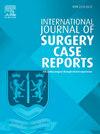淋巴结分期系统在接受腹腔镜手术的胃癌患者中的预后价值:越南的病例系列
IF 0.7
Q4 SURGERY
引用次数: 0
摘要
淋巴结转移是胃癌最重要的预后因素。虽然pN分期系统被广泛使用,但它并没有考虑到清扫淋巴结的总数,这可能导致次优淋巴结切除术患者的分期转移。替代系统,如淋巴结比率(LNR)和阳性淋巴结的对数赔率(LODDS)可能提供更好的预后准确性。我们的目的是比较淋巴结比(LNR)、阳性淋巴结对数赔率(LODDS)和阳性淋巴结数(pN)的预后意义。方法回顾性分析86例胃癌患者行根治性腹腔镜手术的临床资料。生存结果采用Kaplan-Meier分析和log-rank检验进行评估。使用受试者工作特征(ROC)曲线和曲线下面积(AUC)值评估预后准确性。结果根据log-rank检验,三种淋巴结分类系统pN、LNR和LODDS是胃癌患者生存的重要预后因素(p分别为0.007、0.002和0.036)。值得注意的是,在淋巴结清扫少于15个的病例中,只有LNR系统保留预后意义(p = 0.037),而LNR和LODDS在淋巴结≥15个亚组中均有效。结论slnr和LODDS可用于评价胃癌淋巴结转移,特别是淋巴结清扫不充分的患者。这是越南第一个评估和支持整合LNR和LODDS作为胃癌分期补充预后工具的研究。本文章由计算机程序翻译,如有差异,请以英文原文为准。
Prognostic value of lymph node staging systems in gastric cancer patients undergoing laparoscopic surgery: A case-series in Vietnam
Introduction
Lymph node metastasis is the most important prognostic factor for gastric cancer (GC). While the pN staging system is widely used, it does not account for the total number of dissected lymph nodes, potentially leading to stage migration in patients with suboptimal lymphadenectomy. Alternative systems such as the lymph node ratio (LNR) and log odds of positive nodes (LODDS) may provide superior prognostic accuracy. Our aim is to compare the prognostic significance of the lymph node ratio (LNR), log odds of positive nodes (LODDS), and number of positive lymph nodes (pN).
Methods
Eighty-six GC patients treated with curative laparoscopic surgery were retrospectively analyzed. Survival outcomes were assessed using Kaplan-Meier analysis and the log-rank test. Prognostic accuracy was evaluated using receiver operating characteristic (ROC) curves and the area under the curve (AUC) values.
Results
All three lymph node classification systems, pN, LNR, and LODDS, were significant prognostic factors for survival in gastric cancer, (p = 0.007, 0.002, and 0.036, respectively) based on the log-rank test. Notably, in cases with fewer than 15 lymph nodes dissected, only the LNR system retained prognostic significance (p = 0.037), whereas both LNR and LODDS were effective in the ≥15 lymph node subgroup.
Conclusions
LNR and LODDS can be recommended for evaluating lymph node metastasis in gastric cancer, particularly in patients with inadequate lymph node dissection. This is the first study in Vietnam to evaluate and support the integration of LNR and LODDS as complementary prognostic tools in gastric cancer staging.
求助全文
通过发布文献求助,成功后即可免费获取论文全文。
去求助
来源期刊
CiteScore
1.10
自引率
0.00%
发文量
1116
审稿时长
46 days

 求助内容:
求助内容: 应助结果提醒方式:
应助结果提醒方式:


